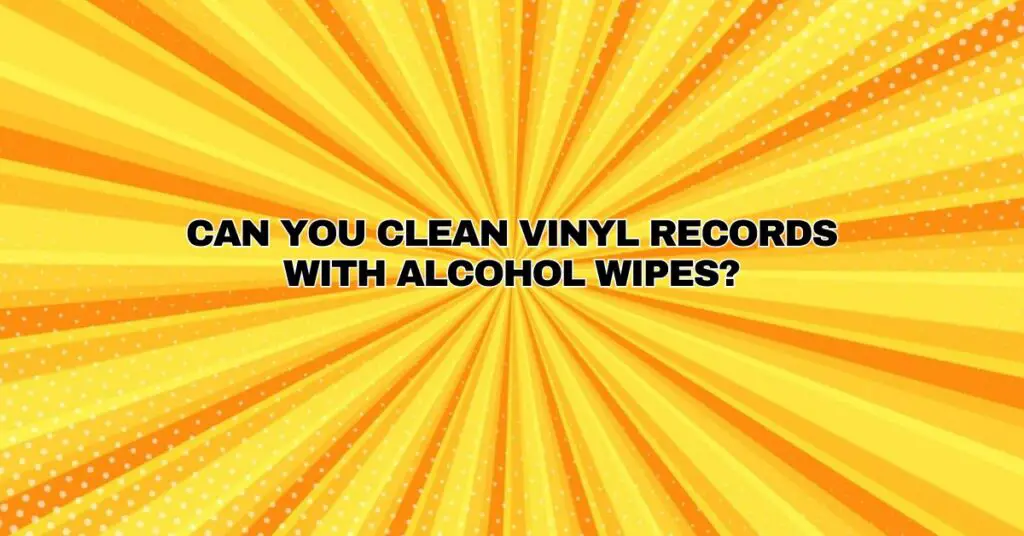Vinyl records have made a remarkable comeback in recent years, and many music enthusiasts appreciate the warm, analog sound that these discs offer. However, vinyl records are also known for their susceptibility to dust, dirt, and grime, which can affect sound quality and playability. To maintain the integrity of your vinyl collection, cleaning your records is crucial. Among the various cleaning methods available, one common question that arises is whether it’s safe to clean vinyl records with alcohol wipes. In this comprehensive guide, we will explore the use of alcohol wipes for cleaning vinyl records and delve into the dos and don’ts of this method.
Understanding Vinyl Record Cleaning
Before we discuss the use of alcohol wipes, it’s essential to understand the importance of keeping your vinyl records clean. Dust, dirt, and fingerprints can accumulate on the record’s surface and within its grooves. These contaminants can lead to audible clicks, pops, and overall reduced sound quality. Proper cleaning not only enhances sound but also prolongs the life of your records.
The Do’s and Don’ts of Cleaning Vinyl Records with Alcohol Wipes
Do:
- Use Isopropyl Alcohol: If you decide to clean your vinyl records with alcohol wipes, opt for high-quality isopropyl alcohol, commonly known as rubbing alcohol. Choose a solution that is 70% or higher in alcohol content. This ensures effective cleaning without leaving behind residue.
- Use Lint-Free and Soft Wipes: When selecting alcohol wipes, make sure they are lint-free and soft. Abrasive or textured wipes can potentially damage the delicate grooves of the vinyl.
- Gently Wipe the Surface: Lightly and evenly wipe the record’s surface using the alcohol wipe. Follow the direction of the grooves to prevent pushing contaminants further into the vinyl.
- Dry Thoroughly: After cleaning, allow the record to air dry completely before playing it. Using a soft, lint-free cloth to gently pat it dry can help.
Don’t:
- Use Harsh Chemicals: Avoid using harsh chemicals or household cleaning products that may contain ingredients harmful to vinyl. Stick to isopropyl alcohol, which is vinyl-friendly.
- Scrub or Rub Vigorously: Never scrub or rub vigorously with alcohol wipes. Excessive pressure or friction can cause permanent damage to the record’s grooves.
- Use on Old or Valuable Records: Exercise caution when cleaning rare or valuable vinyl records. In such cases, it’s advisable to consult a professional record cleaner to avoid accidental damage.
- Reuse Wipes: It’s not recommended to reuse alcohol wipes on multiple records, as they can accumulate contaminants over time.
Alternative Cleaning Methods
While alcohol wipes can be a suitable option for cleaning vinyl records, there are alternative methods that may provide more thorough and gentle cleaning:
- Record Cleaning Brushes: Soft brushes designed for vinyl records can effectively remove loose dust and dirt from the surface and grooves without the use of liquids.
- Record Cleaning Machines: For serious collectors, investing in a record cleaning machine can provide the most thorough cleaning. These machines use specialized cleaning solutions and vacuum systems to remove contaminants.
- Professional Cleaning Services: If you have valuable or heavily soiled records, consider professional cleaning services offered by dedicated vinyl record stores or restoration specialists.
Conclusion
Cleaning vinyl records is an essential part of preserving their sound quality and longevity. While alcohol wipes can be used for cleaning, it’s vital to follow the do’s and don’ts outlined in this guide to ensure the safety of your records. Additionally, consider alternative cleaning methods such as record cleaning brushes, cleaning machines, or professional services for a more thorough and gentle approach. By taking proper care of your vinyl collection, you can continue to enjoy the timeless appeal of analog music for years to come.


